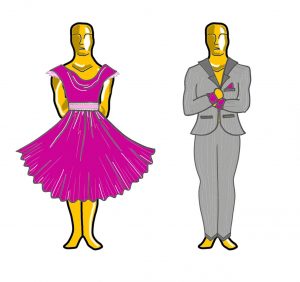It’s Time To Say Bye to Biopics
Movies like ‘Elvis’ and ‘Blonde’ are just hypocritical, shallow ploys for cash and acclaim
November 29, 2022
Films about celebrities such as “Elvis” and “Blonde,” about Elvis Presley and Marilyn Monroe respectively, are seen as independent auteur visions, powerful artistic statements and showcases of fantastic performances. However, it’s more accurate to categorize these movies as dumbed-down retellings of tragic stories for the sake of Hollywood elites earning golden trophies and a lot of money.
Baz Luhrmann’s biopic on the life of Elvis Presley, who is played by Austin Butler, glosses over Presley’s life and paints him as a tortured artist who just wants to sing but is crushed by “the system.” In “Blonde,” directed by Andrew Dominik, we see Ana de Armas’ Marilyn Monroe similarly suffocated by Hollywood, but she’s even less of a fully developed character. De Armas’ version of Marilyn has no complexity, and the movie focuses primarily on her state of suffering rather than deeply interrogating why she acts and behaves the way she does.
The best explanation that we get is a visualization of the neglect and abuse she suffered from her mother, but it isn’t sufficient and seems to just cast her character into the predictable stereotype as “another-girl-with-parental-issues.” Many viewers are repulsed by depictions of people like the one in “Blonde.” The fact that these movies achieve such mainstream success, however, speaks to how we have normalized these retellings as inspired, astute performances when more often they are really just self-indulgent, materialistic and Oscar-baity.
Even though there are differences in both films’ depictions of celebrities being suffocated, they both relish in the imagery of their subjects’ powerlessness. In “Elvis,” we see the tragic fall of the titular character, but it’s difficult to even call “Blonde” a tragedy. The movie presents itself like an inescapable nightmare that only emits pure misery.
Our male heroes are abusive yet tragic figures, while our female characters are shown as victims of abuse in constant misery. Whether we’re watching Elvis trapped in the hotel he can’t escape because of “contractual obligations” or Marilyn being torn apart by trauma, memory and nightmare, both films are obsessed with showing stars being miserable and dehumanized.
Butler’s and de Armas’ choices to play these characters are also worth calling into question. The actors’ intent is very clear in that they simply want the golden trophy — the Oscar. We are programmed to think it is out of these actors’ pure artistic intent — that deep down, regardless of their six- to seven-figure salaries, they just wanted the chance to interpret iconic roles. Or better, they deeply cared about Monroe and Presley. But who would want to embody such tragic and miserable characters with all that makeup and long set hours if it wasn’t for the goal of recognition?
In movies that criticize spectacle and the exploitation of artists, these performers are intent on climbing atop the hierarchy that ensures this toxic system continues. They’ll criticize the sexism and the toxicity of the system while reaping the benefits of it.
This tendency to defend actors’ choices, grounding them in the belief that they’re doing it for their artistic and altruistic interests, is a cover-up for the sad fact that their primary interest is monetary. In movies that criticize spectacle and the exploitation of artists, these performers are intent on climbing atop the hierarchy that ensures this toxic system continues. They’ll criticize the sexism and the toxicity of the system while reaping the benefits of it.
This hypocrisy isn’t only extended to the actors but also the directors themselves. Luhrmann’s style is ostentatious. It condenses and edits away the intricate and complex lives of talented individuals into digestible tidbits and vignettes to fit the movie structure. Luhrmann offers nothing more than a coked-up visual interpretation of Presley’s Wikipedia page. It’s a three-hour-long Instagram Reels montage of the glitz and glamor associated with Presley’s career, and a dumbed-down advertisement for the brand of Elvis. The film counters the dehumanization of people into products by, ironically, commodifying its subject.
In the same respect, “Blonde” counters the male gaze with more male gaze. Why does Andrew Dominik think showing close-up, nude shots of Marilyn offers a legitimate critique of the patriarchy? A solution: Don’t focus the camera or use cinematic techniques that are qualified within the movie as “monstrous,” but rather use new devices of storytelling beyond the sexualization of Monroe. Stop making a circus out of stories that are trying to criticize the entertainment industry.
These movies aren’t an accidental miscommunication of the tragic fall of good-natured artists and the terrors of the male gaze. Rather, their core intentions are to indulge in the sensory experiences of tragedy and mayhem so that audiences everywhere can feel special. These movies give us the impression that we are peeking into an unseen truth — akin to people watching a crime scene or looking at art in a museum. Essentially, it’s voyeuristic eye candy.
These films want viewers to talk with disdain among their peers about the tragedy of Presley and the misery of Monroe — but also about how great the movies about them are — so that they too can be inspired to watch this content in order to participate in the discourse. It isn’t provocative out of pure artistic merit, but rather in order to entice more consumption.
The films are vehicles for stuffy awards, spaces for directors to be self-indulgent, and a hypocritical visual feast for the masses. The pretension around these movies, as if they are anything more than advertisements, is ridiculous. In a culture where everything is a product, let’s stop pretending that these movies rise above the consumerist fantasy. So much of the bile emitted onto the screen is just frenzied nightmare fuel that we watch because Hollywood needs more cash, prestige and big golden statues to put in their cabinets.













